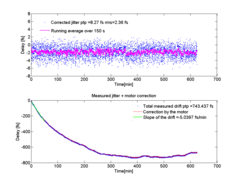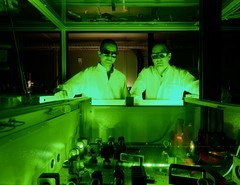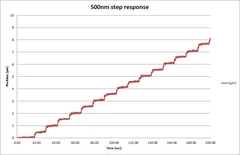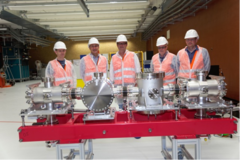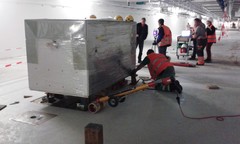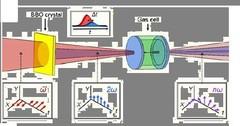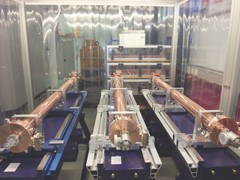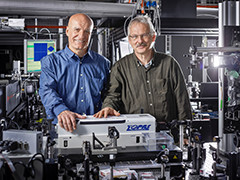News & Scientific Highlights
Laser arrival time measurement and correction for the SwissFEL lasers
To probe ultrafast processes at SwissFEL it is crucial that the pump laser, used at the end stations, arrives in time with the generated X-ray pulses. For fs resolution pump probe experiments a path-length change of few-hundred nanometers already affects the measurement quality. The length of SwissFEL and the total propagation path of the pump laser light to the experiment is in the scale of several hundred meters, which makes this task challenging.
Umbrella MoU Signed by 14 Parties
The Memorandum of Understanding of the Umbrella Collaboration was signed by 14 parties: ALBA, DESY, Diamond Light Source Ltd, Elettra, EMBL Heidelberg, ESRF, European XFEL, HZB, ILL, Instruct Academic Services Ltd, KIT, PSI, STFC and SOLEIL.
Terahertz laser light focused to the extreme
There are limits to how short a flash of light can be – in both time and space. Researchers from the Paul Scherrer Institute (PSI) have now succeeded in reaching these physical limits and producing the smallest possible flash. To do so, they used terahertz light, which is physically related to visible light or radio waves, but differs in its wavelength.
High-Precision Vertical Linear Translation for Offset Mirrors
The horizontal and vertical offset mirrors are key optical elements for the SwissFEL ARAMIS Beamline. The offset mirrors for example, are used to deflect and steer the x-ray beam into one of the end stations. As the sample position is about 60m from the mirror, very high demands are put on the mirror positioning system in order to deflect the x-ray beam on to the sample with a micro-meter precision. Therefore precise positioning of the mirrors is required, with specifications to move a load of up to 200kg by steps as small as 0.3µm. Not just the positioning must be precise, but also the stability for short term vibrations and long term drifts must be superior.
PSI-DESY Collaboration Delivers First Photonics Component for SwissFEL
The Photon Beam Intensity Gas (PBIG) monitor arrived at PSI at the end of May, and will be one of the first photonics components to be installed in the new SwissFEL facility.The gas-based photon beam position and intensity monitor is a device originally developed by Dr. Kai Tiedtke and his team at the Deutsches Elektronen-Synchrotron (DESY) for the non-destructive measurement of an X-ray FEL's beam position and flux. The accurate measurement of these variables is necessary due to the stochastic nature of the self-amplified spontaneous emission (SASE) process which can create jitters in the position and flux of the FEL beam on a shot-to-shot basis. The device has been developed and adapted to fit the SwissFEL parameters in a PSI-DESY collaboration over the course of two years.
Beam Stoppers for SwissFEL
On the 5th of May the two beam stoppers were installed in the SwissFEL tunnel. These two blocks are made out of copper, recycled lead, steel and concrete blocks and weight 60 tons each. These stoppers are placed in front of both Aramis and Athos undulator lines.
Table-top soft x-ray lasers based on high-order harmonic generation (HHG)
Table-top soft x-ray lasers based on high-order harmonic generation (HHG) deliver routinely linearly polarized light. Many advanced applications including magnetic imaging would profit from a HHG source delivering in addition circular polarized light. In one of our recent work we present now an approach which provides intense soft x-ray radiation of high ellipticity. This source has given us the opportunity to realize the first magnetic dichroism experiment on a nickel sample at 18 nm (67 eV) with a table-top HHG source.
Successful start of the series production of the C-band accelerating structures for SwissFEL
A total of 104 C-band accelerating structures will be needed for SwissFEL. Each of these structures is about 2 m long and consists out of 113 copper cells that are manufactured with micrometer precision using ultra-precision diamond machining, which results in mirror-like surfaces. The main components are the couplers at the input and the output of the structure, and the copper disks. For both, couplers and disks, the series production was successfully launched at the end of 2014. Since then the Dutch company VDL and TEL Mechatronics in Trübbach, Switzerland, delivered already many sets of couplers and accelerating disks, respectively.
Prospective studies for SwissFEL experiments done at the SLS FEMTO station
For many years, PSI researchers have been testing experimental methods that will provide insights into novel materials for electronic devices. Using a special trick to make the Swiss Light Source (SLS) at PSI generate light with similar properties to that of PSI's x-ray laser SwissFEL, the researchers were able to demonstrate that the experiments planned for SwissFEL are possible and they are now building an experimental station at SwissFEL. read the full story)
